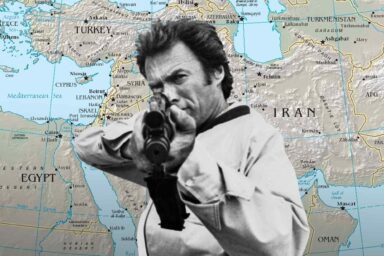The deal announced by Vice President Mike Pence on Thursday leaves more questions than answers.
After a dramatic week of brutal and inconclusive fighting in northern Syria, Turkey and the US agreed to a ceasefire on Thursday which has seemingly brought the NATO allies back from the edge of a precipice. American sanctions on Ankara will be rescinded if a five-day truce holds, and the Syrian Kurds, formerly the most reliable US ally in the war against ISIS, will be expected to pull their forces back from the border.
This deal could NEVER have been made 3 days ago. There needed to be some “tough” love in order to get it done. Great for everybody. Proud of all!
— Donald J. Trump (@realDonaldTrump) October 17, 2019
President Donald Trump, who sent Vice President Mike Pence to negotiate the agreement, predictably claimed victory. The deal allows him to preserve America’s fragile ties with Turkey, which hit such lows after the invasion that Fox News claimed Turkey was holding 50 aging nukes “hostage.”
Turkey’s President Recep Tayyip Erdogan also claimed that he received what he wanted: WhoWhatWhy’s early reporting of the invasion withstood the test of a few days’ time and Erdogan increasingly found himself isolated internationally and bogged down in a potential military quagmire.
How exactly the deal will be implemented, however, is anybody’s guess.
“The US is leaving Syria,” tweeted Aaron Stein, the Middle East Program director at the Foreign Policy Research Institute, a Philadelphia-based think tank. “And has no leverage. And the YPG wont [sic] leave. So other than that, it is all good.”
https://twitter.com/Elizrael/status/1184895833222930435
On the face of it, the Syrian Kurds have every reason to reject the agreement. They captured most of the territory from ISIS, which they defeated with American help, and again over the past week fought bravely against an invasion by Turkey and its jihadist proxies.
“The cease-fire deal is exactly what #Turkey wanted and will mean the Kurdish cities will fall in the so-called safe zone,” tweeted Mahmoud Othman, a Kurdish politician from neighboring Iraq. “The US administration should work towards a deal which is a real compromise and protects their #Kurdish allies, not for complete surrender of their areas.”
But stranger things have happened in the past days. After Trump announced a withdrawal of US forces from Syria, declining to protect his former ally against Turkey’s aggression, the Kurds invited the Russian-backed forces of Syrian President Bashar Assad back into their lands. The Syrian army has already entered some of the towns from which the Kurds would presumably withdraw, and according to regional media reports (in Arabic), the Syrian government has said it is not bound by the deal.
Erdogan is expected to travel to Moscow in the coming days, and observers expect further details about the fate of northeastern Syria to emerge from his meeting with Russian President Vladimir Putin. Moscow has been pushing for a deal that would see the Syrian government take over the Kurdish-held areas, in exchange for political concessions to the Kurds.
“[The Kurds] coexisted with Assad,” tweeted Dimitar Bechev, a prominent regional geopolitical expert at the University of North Carolina at Chapel Hill. “Turkey (and Russia) delivered to him northeast Syria. Next step: Ankara restores ties with the Assad regime, after years of back-chanelling.”
In line with our earlier reporting, Assad and Russia, alongside ISIS, stand most to gain from the chaos following the Turkish invasion. Hundreds of ISIS prisoners and relatives have escaped so far, and according to some reports the local Turkish proxies have deliberately released some of these captives.
We continue to monitor the situation closely. Stay tuned.

